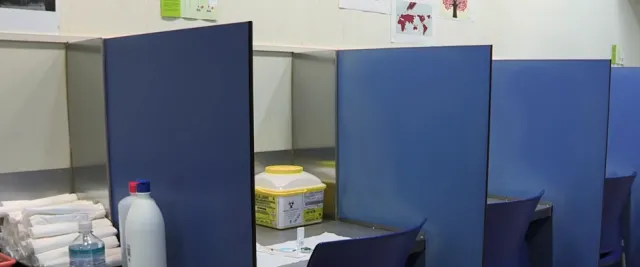| Opioid withdrawal with antagonists under minimal sedation to retain patients and reduce relapses |
Treatment |
opioids |
|
Unknown effectiveness |
| Drug consumption rooms (DCRs) to reduce harms for homeless and vulnerably housed persons |
Harm reduction |
amphetamines, opioids |
PWID – people who inject drugs |
Unknown effectiveness |
| Workplace-based interventions for the prevention and treatment of problematic substance use |
Prevention |
|
|
Unknown effectiveness |
| Primary care behavioural interventions to prevent or reduce substance use in children and adolescents |
Prevention |
not-drug specific |
communities, young people |
Unknown effectiveness |
| Psycho-social treatment (including contingency management) to improve crack-cocaine users employment conditions |
Social reintegration |
cocaine |
|
Unknown effectiveness |
| Behavioural activation (BA) interventions to reduce substance use and depressive symptoms |
Treatment |
co-morbidity |
dual-diagnosis patients |
Unknown effectiveness |
| Targeted school-level interventions to prevent multiple risk behaviours relating to alcohol, tobacco and drug use |
Prevention |
alcohol, cannabis, tobacco |
school |
Unknown effectiveness |
| School-based generic prevention programs in preventing alcohol misuse in school-aged children up to 18 years of age |
Prevention |
alcohol |
school |
Unknown effectiveness |
| Community interventions to reduce harms from alcohol and other drug use |
Prevention |
alcohol, not-drug specific, cannabis |
communities |
Unknown effectiveness |
| Telemedicine-delivered treatment interventions for substance use disorders |
Treatment |
alcohol, opioids, tobacco |
communities, dual-diagnosis patients, emergency department, ethnic minority, families, law enforcement, pregnant women, PWID – people who inject drugs, school, women, prison, young people, partygoers/nightlife |
Unknown effectiveness |
| School-based eHealth interventions to prevent risk behaviours |
Prevention |
not-drug specific |
young people |
Unknown effectiveness |
| Opioid withdrawal for adolescent opioid users |
Treatment |
opioids |
young people |
Unknown effectiveness |
| Needle and syringe programmes in prison to prevent HIV and HCV infection and reduce injecting risk behaviours |
Harm reduction |
opioids |
prison |
Unknown effectiveness |
| Brief interventions delivered in general medical settings to reduce use and harms |
Treatment |
alcohol, cannabis |
|
Unknown effectiveness |
| Occupation-based interventions to improve recovery outcomes |
Social reintegration |
|
|
Unknown effectiveness |
| Cognitive-behavioural treatment (CBT) to reduce stimulant use |
Treatment |
amphetamines, cocaine |
|
Unknown effectiveness |
| Employer-led interventions to reduce use and adverse effects |
Social reintegration |
not-drug specific |
|
Unknown effectiveness |
| Family and individual-based interventions to prevent multiple risk behaviours relating to alcohol, tobacco and drug use |
Prevention |
alcohol, cannabis, tobacco |
families |
Unknown effectiveness |
| School-based brief interventions to reduce substance use and delinquent-type behaviours |
Prevention |
alcohol, cannabis |
school |
Unknown effectiveness |
| Neurostimulation techniques in the treatment of cocaine dependence |
Treatment |
cocaine |
|
Unknown effectiveness |
| Assertive community treatment (ACT) for substance use disorders |
Treatment |
alcohol, co-morbidity, not-drug specific, amphetamines, cannabis, cocaine, new psychoactive substances (NPS), opioids, prescription medicines, tobacco |
communities, dual-diagnosis patients, emergency department, ethnic minority, families, law enforcement, pregnant women, PWID – people who inject drugs, school, women, prison, young people, partygoers/nightlife |
Unknown effectiveness |
| Psychotherapy to improve mental and treatment outcomes in patients with comorbid bipolar and substance use disorders |
Treatment |
not-drug specific |
dual-diagnosis patients |
Unknown effectiveness |
| Brief interventions in patients with comorbid substance use |
Treatment |
co-morbidity |
|
Unknown effectiveness |
| Substitution treatment for adolescent opioid users |
Treatment |
opioids |
young people |
Unknown effectiveness |
| Pub-watching schemes to reduce alcohol-related crime against property |
Prevention |
alcohol |
law enforcement, partygoers/nightlife |
Unknown effectiveness |
| Opioid substitution treatment (OST) to prevent HIV and HCV in prison |
Harm reduction |
opioids |
prison |
Unknown effectiveness |
| Therapeutic communities to improve treatment outcomes |
Treatment |
not-drug specific |
|
Unknown effectiveness |
| Permanent supportive housing (specifically Housing First) to reduce harms |
Harm reduction, Social reintegration |
not-drug specific |
communities |
Unknown effectiveness |
| Psycho-social treatment (including contingency management) to improve crack-cocaine users housing conditions |
Social reintegration |
cocaine |
|
Unknown effectiveness |
| Psychosocial interventions to reduce alcohol use among people who use illicit drugs |
Treatment |
alcohol |
|
Unknown effectiveness |
| Therapeutic workplace (TW) to improve employment outcomes |
Social reintegration |
not-drug specific |
|
Unknown effectiveness |
| Standalone knowledge-based school interventions to improve knowledge and reduce use |
Prevention |
not-drug specific |
school |
Unknown effectiveness |
| Spiritual/religious (S/R) interventions for substance use disorders |
Treatment |
alcohol, co-morbidity, not-drug specific, amphetamines, cannabis, cocaine, new psychoactive substances (NPS), opioids, prescription medicines, tobacco |
|
Unknown effectiveness |
| Digital interventions to reduce cannabis use among adolescents and young adults |
Treatment |
cannabis |
young people |
Unknown effectiveness |
| Pyschosocial interventions versus comprehensive standard care for pregnant women for treatment and obstetrical outcomes |
Treatment |
cocaine, opioids |
women |
Unknown effectiveness |
| Restricting opening hours to reduce alcohol related injuries |
Prevention |
alcohol |
partygoers/nightlife |
Unknown effectiveness |
| Pharmacological vs non-pharmacological treatment to reduce use and criminal activity in drug-using offenders |
Treatment |
not-drug specific |
prison |
Unknown effectiveness |
| Scare-tactics and fear-based messages to inform choices on substance use |
Prevention |
|
|
Unknown effectiveness |
| Family focused interventions that address parental domestic violence and abuse, mental ill-health, and substance misuse |
Treatment |
not-drug specific |
families |
Unknown effectiveness |
| Drug consumption rooms to reach most marginalized injecting drug users and to facilitate access to health care services |
Harm reduction |
amphetamines, opioids |
PWID – people who inject drugs |
Unknown effectiveness |
| Standalone anti-alcohol/tobacco peer programmes |
Prevention |
alcohol, tobacco |
school |
Unknown effectiveness |
| Needle and syringe programmes in prison to reduce injecting risk behaviours |
Harm reduction |
opioids |
PWID – people who inject drugs |
Unknown effectiveness |
| Pharmacotherapies to reduce stimulant use in comorbid opioid users |
Treatment |
cocaine, opioids |
|
Unknown effectiveness |
| Culturally sensitive substance use treatment for racial/ethnic minority youth to reduce use |
Treatment |
not-drug specific |
ethnic minority, young people |
Unknown effectiveness |
| Multicomponent programmes to control alcohol sales |
Prevention |
alcohol |
partygoers/nightlife |
Unknown effectiveness |
| Pharmacological treatment (OST) vs placebo treatment to reduce use in female drug-using offenders |
Treatment |
opioids |
women, prison |
Unknown effectiveness |
| Nonpharmacological adjunctive treatment for postpartum women to reduce opioid use |
Treatment |
opioids |
women |
Unknown effectiveness |
| Employment-based interventions for vulnerably housed persons |
Social reintegration |
not-drug specific |
|
Unknown effectiveness |
| Pharmacotherapies for cannabis use disorder |
Treatment |
cannabis |
|
Unknown effectiveness |
| Job Seekers Workshop (JSW) to improve employment outcomes |
Social reintegration |
not-drug specific |
|
Unknown effectiveness |












